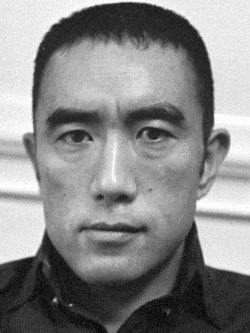
Yukio Mishima (三島 由紀夫, Mishima Yukio), born Kimitake Hiraoka (平岡 公威, Hiraoka Kimitake, 14 January 1925 – 25 November 1970), was a Japanese author, poet, playwright, actor, model, Shintoist, ultra-nationalist, and leader of an attempted coup d'état which culminated in his suicide. Mishima is considered one of the most important postwar stylists of the Japanese language. He was considered for the Nobel Prize in Literature five times in the 1960s—including in 1968, but that year the award went to his countryman and benefactor Yasunari Kawabata. His works include the novels Confessions of a Mask and The Temple of the Golden Pavilion, and the autobiographical essay Sun and Steel. Mishima's work is characterized by "its luxurious vocabulary and decadent metaphors, its fusion of traditional Japanese and modern Western literary styles, and its obsessive assertions of the unity of beauty, eroticism and death", according to author Andrew Rankin.
Mishima's political activities made him a controversial figure to the present day. From his mid-30 onwards, Mishima's far-right ideology and reactionary beliefs became increasingly evident. He extolled the traditional culture and spirit of Japan, and opposed what he saw as western-style materialism, along with Japan's postwar democracy (戦後民主主義, sengo minshushugi), globalism, and communism, worrying that by embracing these ideas the Japanese people would lose their "national essence" (kokutai) and distinctive cultural heritage to become a "rootless" people. In 1968, Mishima formed the Tatenokai ("Shield Society"), a private militia, for the purpose of protecting the dignity of the Emperor as a symbol of Japan's national identity. On 25 November 1970, Mishima and four members of his militia entered a military base in central Tokyo, took its commandant hostage, and unsuccessfully tried to inspire the Japan Self-Defense Forces to rise up and overthrow Japan's Article 9 of 1947 Constitution to restore autonomous national defense, and the divinity of the Emperor, after which he died by seppuku.
Source : Wikipedia